Futuristic digital technologies, such as Artificial Intelligence, Machine Learning, the Internet of Things, Robotic Process Automation, Industry 5.0, etc., have empowered the software development industry to undergo a massive transition. Businesses are quickly adopting innovative approaches to streamline and simplify project management, which has helped to optimize available resources, reduce time, and boost revenue generation.
However, the other side of the story is that several projects fail for various reasons. As a result, the initiating companies incur huge losses because all efforts and time invested become futile, leading to distrust, frustration, and loss of a potential client. Companies are estimated to waste about 12% of their valuable resources due to improper project management. Organizations must implement intelligent and agile project management practices coupled with adopting the latest trends to mitigate all such possibilities and adverse scenarios.
Goodfirms Leaders Roundtable is a series of podcast sessions where top leaders of successful ventures and professionals holding managerial positions discuss their journeys and share their rich experiences with global audiences to help them accomplish their goals.
In this podcast session, we are conversing with Pranjal Mehta, Managing Director of Zealous System.
Pranjal Mehta has been leading the company since 2012, efficiently managing its operational infrastructure. Zealous System is a premier IT Consulting and Software Development organization that provides web and mobile app development for various industries. Furthermore, it holds expertise in offering an extensive array of services, such as product engineering, enterprise mobility, ERP, etc., and working with the next generation of technologies.
The following podcast discussion will focus on
- Top reasons why projects fail
- Tips to reduce or nullify project failure
- Critical factors in setting project goals
- Key reasons why Agile projects are succeeding more
This podcast will further enlighten you on
- The best software governance practices to follow,
- Role of software skills and communication in derailing software development projects
- The most crucial element of the software development lifecycle
- How Goodfirms helped Zealous System in meeting its expectations?
A recent survey shows that over 66% of software projects fail. Considering the critical role that IT and software solutions play in how we work—and live, can you please outline why software projects fail?
I will give you the top three reasons why software and IT projects fail.
One of the prime and most critical reasons is that IT companies make unrealistic commitments with their clients because they have to battle and survive the stiff market competition. This holds true especially for IT startups trying to get more clients to make their space and name in the industry. A YES culture in this industry also prevails, and many IT firms fall prey to it by saying yes to unrealistic expectations.
I feel that the software industry is also getting tapped by non-technical persons in this world scenario. They often rely on standard rates and secondary research while planning their projects’ budget estimates. This often leads to budget constraints over time and may also hamper the progress of the software.
IT is an ever-evolving industry where many new platforms like SaaS, PaaS, and transformative technologies are evolving on a constant note. But newbie entrepreneurs don’t have adequate experience and expertise on how to unleash and reap the benefits of such advanced technologies. Hence, they have to encounter various technical challenges, which may lead to software project failure or loose coding.
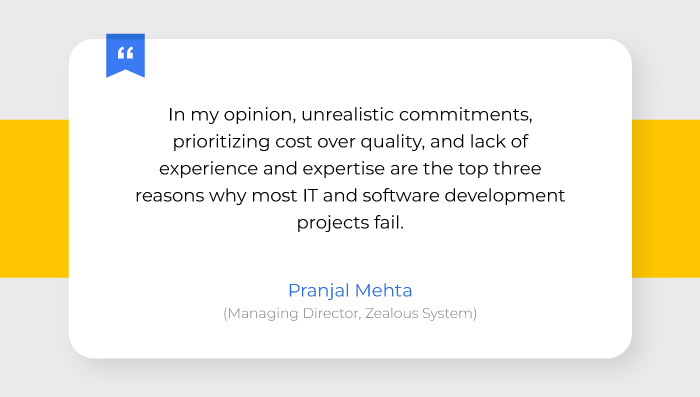
Today's enterprises operate in a world defined by distributed networks, teams, cloud-based computing, and a rapidly developing Big Data ecosystem that is increasingly challenging to manage. In response to these new Software governance problems, what software development governance practices does Zealous employ?
Zealous System implements modern and robust software development governance practices to ensure data security. We have relied heavily on self-inspection or self-governance. The idea is to train the resources, introduce processes that lead to self-scrutiny, and ensure who an expert is in their field or work, evaluating their own work.
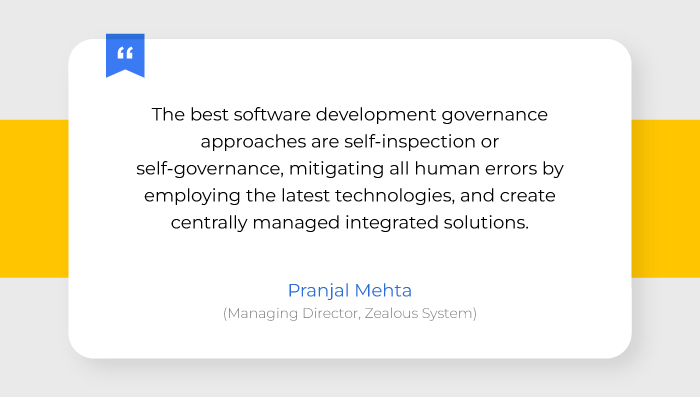
The second crucial element is to eliminate all human errors while carrying out redundant tasks. We are integrating Robotic Process Automation (RPA) capabilities into our enterprise to accomplish this goal. It helps to reduce tedious tasks so that our employees can dedicate their energies to productive and integral software development tasks.
To establish digital accountability and to create a centralized view for the decision-makers, we have been paving our path toward breaking silos and creating integrated solutions that can be centrally managed.
A software project can go wrong in a variety of ways. As previously stated, prevention is always preferable to cure. Is there a standard method or checklist that Zealous follows to reduce any risk to the project?
If you want to mitigate all risks and wish all plans work your way, it becomes crucial to deploy experienced consultants before commencing a software development project. They analyze the requirement thoroughly and do cross-validation and competitive analysis. As a result, you can develop an improved version of the application as compared to what was needed in the first place. Also, they help in preparing a complete blueprint for migrating to the next steps and achieving what you have just envisaged.
In a nutshell, in the entire journey behind any product development, there are skilled professionals taking part and playing a vital role in assuring quality outcomes.
Findings of each professional in any step of this journey are regularly shared with clients, and flags have also been made wherever required to make sure things go as planned.
We all know how crucial technical abilities are, but how significant are soft skills and communication in derailing software development projects?
I believe that you cannot confine software projects to any particular organization or country. You will have to assign large and complex projects to an experienced bunch of professionals and expert teams' that can efficiently manage all tasks. Also, the round-the-clock development trend has gained traction in which organizations focus on the multi-vendor ecosystem.
Because of this, soft skills have become necessary as resources that cannot cope with the cosmopolitan culture can heavily affect the project's environment, productivity, and timeline.
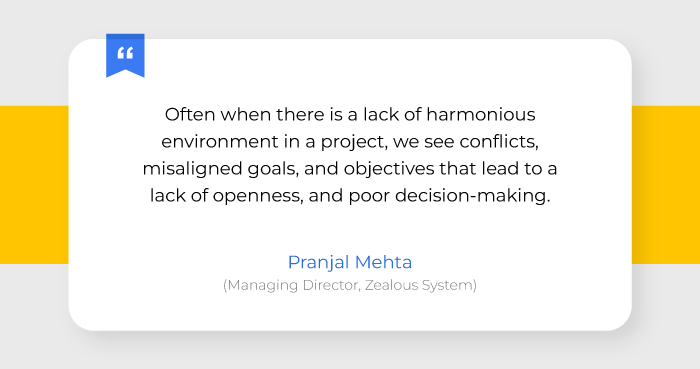
As you indicated previously, the biggest reason for software project failure is unrealistic expectations. What factors do you keep in mind or take into account while setting goals for a software project?
Pranjal has suggested a few vital factors that you should consider while setting goals for a software project. These are
- First and foremost, you must take one step at a time and categorize the entire project into small milestones. You can again divide these milestones into daily tasks. You must communicate with the team regularly through meetings and keep them up to date on the latest developments.
- You must recruit a cross-functional team and experienced resources to efficiently manage and govern the project.
- Establishing transparent and inclusive communication channels is imperative to keep the client aware of the developments.
- It is recommended that customers or clients should first approach the market with a Minimum Viable Product (MVP). Also, if you are developing software for the open market, you should break the project into different phases. It helps to complete the project successfully within the stipulated time and budget constraints.MVP reduces the chances of project failure.
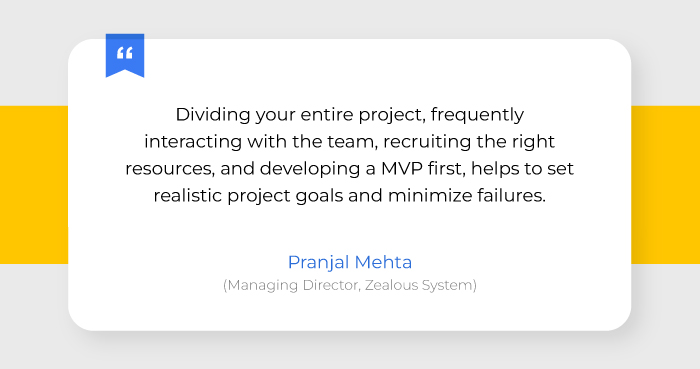
In your opinion, what stage of the SDLC is the most critical to project success and faces the most challenges, and which stage is the least important or slightly easier?
I believe that every stage in the software development life cycle is crucial, and you cannot miss out on even a single phase. And as it is rightly said that a well begun is half done, we ensure the project's success by conducting a business and project understanding. The other important task is to carry out a series of tests, such as software testing, user acceptance testing, etc., before the launch.
According to a study, agile projects are statistically 2x more likely to succeed and 1/3 less likely to fail than Waterfall projects. What, in your opinion, are the reasons for higher success rates in agile methodology, and is there a place for waterfall methodology in the coming years?
Yes, undoubtedly, Agile projects have the edge over Waterfall projects. I also completely agree that agile methodologies have become more successful than Waterfall. I’ll highlight two critical reasons for their success.
With the passage of time, projects are becoming more complex. So, the demand for highly scalable software solutions has increased. These software tools are flexible, and you can update them based on changing market conditions.
The Waterfall model is relevant only for small projects with defined requirements.
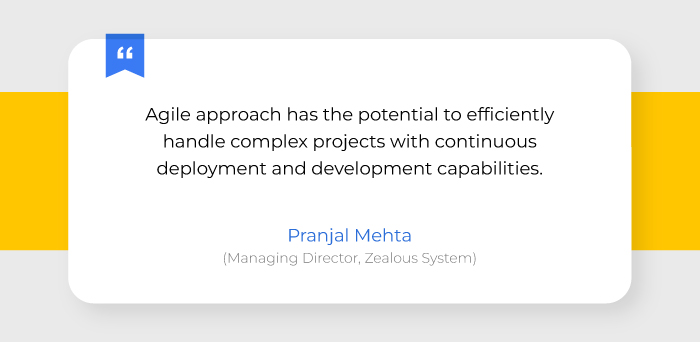
Lastly, talking about failures, we hope that Goodfirms has never failed to meet your expectations. Could you please share some details on how Goodfirms has aided Zealous since your partnership with our platform?
I believe enlisting our company with the Goodfirms platform has provided us an upper hand in the ent competitive scenario. Not only did the top-rated IT research and review company enable us to connect with amazing potential clients, but the platform has also recognized our development and client management capabilities, including our expertise in various technologies. I thank them for providing us with the much-required validation and credibility that clients highly seek in the current competitive IT domain.
You can listen to this podcast discussion here.
What’s Next
“Managing a project without a project management tool is like playing soccer without a game plan.” says Karen Tate, renowned author, and independent scholar.
A project fails due to different causes. So, it’s essential to identify the actual reason and take appropriate action to avoid them. Software development companies must implement a project management solution aligned with advanced technology and the latest trends, providing better visibility, improved resource planning, and enhanced team communication.
About Leaders Roundtable
Goodfirms Leaders Roundtable is a drive that addresses the various challenges and issues faced by newbie entrepreneurs through podcast discussions in which top global leaders share their experiences on various topics.
If you want to participate in this podcast discussion, send an email to [email protected].








